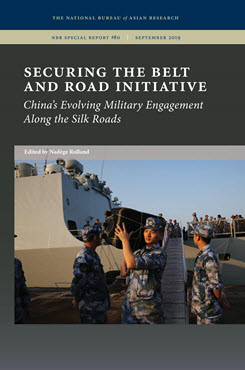Overseas Military Operations in Belt and Road Countries
The Normative Constraints and Legal Framework
This essay explores possibility of future Chinese military operations in Belt and Road Initiative (BRI) countries in defense of China’s overseas interests and discusses the constraints that could prevent such operations.
EXECUTIVE SUMMARY
MAIN ARGUMENT
China has followed three models for protecting its overseas interests. In Djibouti, China built a naval base in a break with its strategic history. On its western border with Afghanistan and Tajikistan, the country is following a Mekong model, albeit in a very low-key manner to avoid international attention. In Syria, China free-rides and prioritizes access to intelligence about individuals who could target Chinese interests. These three approaches have in common the prioritization of both capacity building and intelligence acquisition. The overarching goal is to build a strategic position that will give China options when a serious crisis requires an immediate response. If confronted with such a crisis, all the ingredients exist for China to conduct overseas military operations: growing capacities, strong political support, an expansionist narrative centered on the defense of overseas interests, a new posture on military bases, and the risks inherent to China’s increasing international human and economic footprint in BRI countries. Within this context, it is only a matter of time before the People’s Liberation Army or People’s Armed Police is dispatched on missions to defend overseas interests. Nonetheless, cost-benefit assessments in Beijing and a weak logistical network will continue to constrain future overseas military operations.
POLICY IMPLICATIONS
- How to deal with an interventionist China that considers military power as a foreign policy tool should become a central policy question on the transatlantic agenda.
- China uses the legitimate defense of its expanding security interests to enlarge its global footprint and compete with the United States. The narrative of protecting overseas interests is difficult to counter, but at a minimum it invites deeper engagement with states that consider military cooperation with China as a credible alternative.
- China’s defense of its overseas interests will create opportunities for cooperation against nontraditional security threats. However, there is very little for the West to gain in actively pursuing cooperation with China, and the West instead should focus on setting strict terms for examining Chinese engagement offers.
Mathieu Duchâtel is Director of the Asia Program at Institut Montaigne. Dr. Duchâtel worked in Beijing as the China representative of the Stockholm International Peace Research Institute (SIPRI) from 2011 to 2015 and at the European Council of Foreign Relations from 2015 to 2018.



